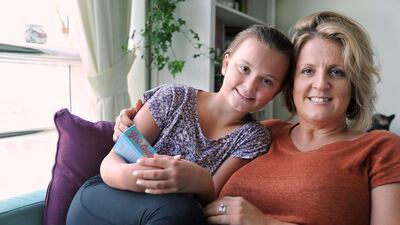Life can be tough for youngsters as they reach an age when their world starts opening up and they realise they’re not at the centre of it anymore.
According to parenting coach Joanne Jewell, the best way parents can help their offspring make the transition from childhood to adolescence is to practice the art of mindful parenting.
In its simplest sense, mindfulness is about calming your mind by learning to focus on one thing at a time. “We spend a lot of our days rushing from one thing to another and multitasking, which is quite stressful for our brains,” says Jewell, who is hosting a parenting workshop in Abu Dhabi on Saturday, September 24, with more to follow in October and November. “Doing it all the time doesn’t really give the brain time to recharge.”
As mindfulness has become a new buzzword in self-help lingo, misconceptions have sprung up around it. “People feel it’s some special practice you have to be trained in,” she says. “But it isn’t necessary to pay a load of money to learn, and you don’t need to spend two hours a day doing it.”
Parents can develop mindfulness by making a conscious effort to focus their minds on an everyday activity, such as drinking a cup of tea in the morning. “Really focus on how the cup feels in your hand, and what it smells like,” says Jewell. “Whenever you’re focusing on just one thing, your mind will wander, naturally. Mindfulness is about noticing it has wandered and not judging that, but just bringing it back to what you were focusing on.”
The next step is for parents to incorporate mindfulness into their relationships with their children. “Often when I’m out, I see people in the middle of a conversation with their child, looking down at their phone. When you’re talking to a child, it’s easy for the mind to wander. But being mindful means giving your child full attention when they need it. It’s about being aware of your emotions and being connected to your children, and then it’s much easier to gain their cooperation and help manage their emotions.”
Adolescence is a stage where children become much more interested in their peers, and when parents tend to step back a little. But don’t step back too much, warns Jewell. “It’s important to know your child’s world. You need to really understand social media, so when your children are talking about stuff, you’re able to connect with them on their level. If your child has a favourite TV programme, sit and watch it with them, and talk to them about what’s going on. If they have a favourite PlayStation game, play it with them.”
British mum Sam Walter incorporates mindfulness in her relationship with her 11-year-old daughter Lily. “If she’s watching something on the iPad, we watch together, to avoid isolation,” she says. “We’ve recently taken to reading together as a family after dinner each evening, so we’re all relaxing together. It’s my favourite time of day and the cats must pick up the vibe too, because they come and snuggle down.”
Walter started exploring mindfulness three years ago as a technique to alleviate insomnia, rather than reaching for the pills her doctor recommended. Nowadays, she teaches a course on mindfulness to youngsters at British School Al Khubairat, and claims that being mindful makes her a better parent.
“I practice breathing and pausing before responding to Lily, so I’m not reacting immediately,” she says. “If I want to talk to her about something, I ask if it’s a good time, because sometimes she isn’t in a good place to receive information. It’s about really listening to her point of view and empathising with her. I also tell her specifically, every day, three reasons why I love her, which is having a massively positive effect.”
It’s easy to dismiss pre-teen tantrums as the result of hormonal eruptions. But Jewell recommends parents fully educate themselves about the emotional and physiological changes their youngsters are going through.
“A lot of adults think of children’s brains as miniature adult brains, but they aren’t at all,” she says. “If you have a good understanding of what’s happening in your child’s development, when you see certain behaviours occur, you’ll have a much better idea of why that’s happening and be able to support them through it.”
Three tips to becoming a mindful parent:
1. Download the Headspace app — simply plug in headphones and follow guided instructions. You don't have to be lying down in a darkened room, you can even do it at your desk at work. We're assured it won't send you to sleep. Encourage your kids to try out the new Headspace for Kids service, within the Headspace app. It offers soothing sounds, breathing exercises, visualisation exercises and focus-based meditation under five themes: calm, focus, kindness, sleep and wake up.
2. Attend one of Joanne Jewell's mindful parenting courses. The next one for parents of preteens is at Dots& Links Skills Development Centre in Abu Dhabi on Saturday, September 24 from 1pm-5pm. There will also be courses held on October 22 and again on November 19. Dh1,800 per person or Dh2,800 per couple. Call 02 666 0948 or visit www.mindfulparentinguae.net
3. Read a book to understand your child's brain — like the New York Times bestseller The Teenage Brain: A Neuroscientist's Survival Guide to Raising Adolescents and Young Adults (2016, HarperCollins), by Frances E Jensen.
artslife@thenational.ae

